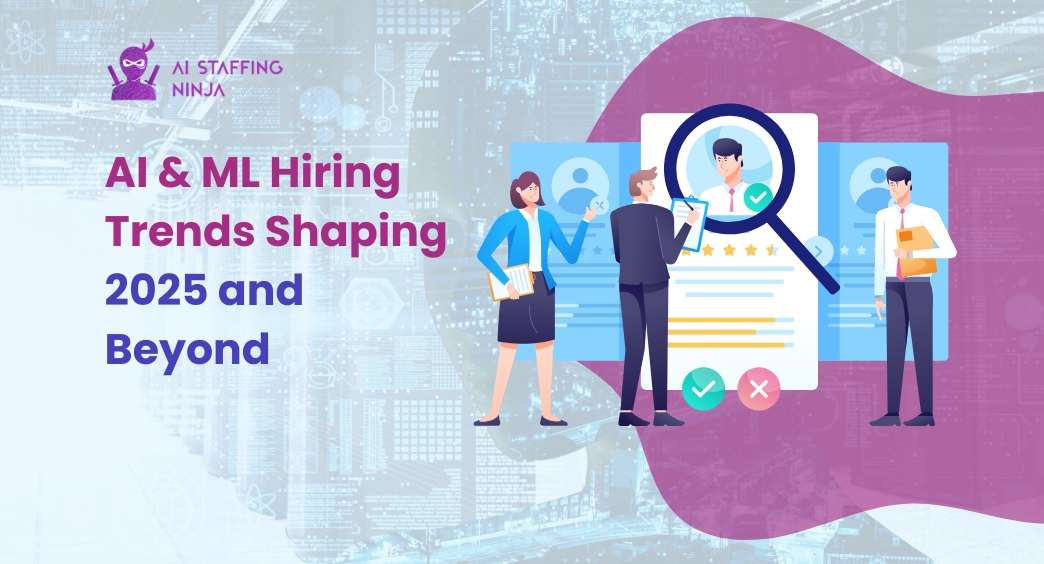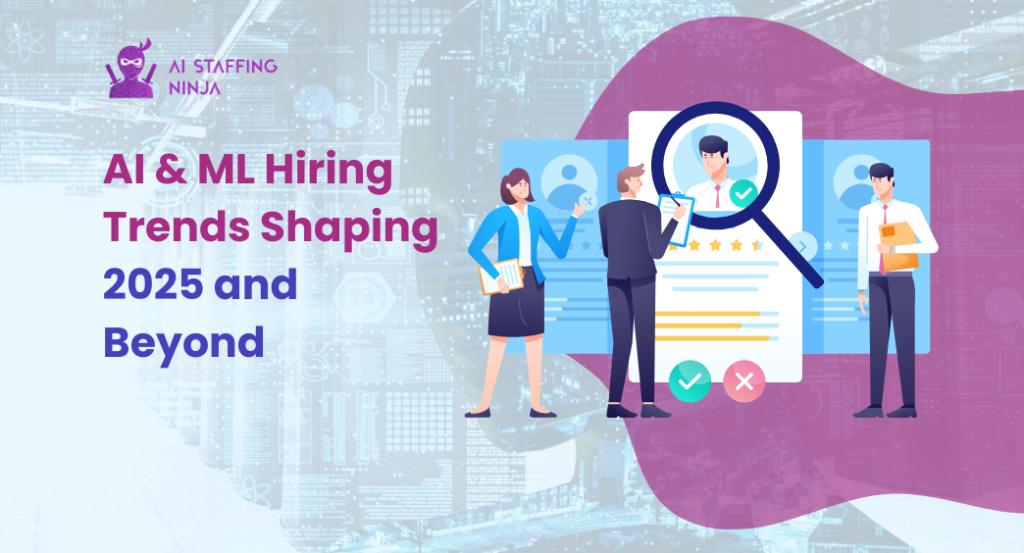
- By : By Staffing Ninja
AI and ML Job Market Trends: What to Expect in the Next Five Years

What was once thought to be niche technologies in AI and ML has now become inevitable due to their widespread use in automating repetitive processes, increasing resource utilization, improving decision-making, and perfecting precision processes. The job market has progressed to the point where companies seek AI and ML experts in their large teams for increased productivity and perfection. This mind-blowing trend is set to continue; thus, an insightful exploration of the future of AI jobs over the next five years is imperative.
Current State of the AI and ML Job Market
- Overview of Existing Roles and Demand: AI and ML job opportunities have resulted in the creation of numerous popular positions such as Data Scientists, AI Product Managers, Machine Learning Engineers, and AI Researchers. These roles are in high demand across a variety of industries, including healthcare, finance, and manufacturing. AI hiring in healthcare is on the rise, particularly in diagnostics, drug discovery, and personalized medication. AI is used in finance to detect fraud, perform algorithmic trading, and provide personalized financial counselling. In the manufacturing industry, AI automates repetitive processes to near-perfect precision.
Statistical Insights: AI & ML job market trends have grown up to 86% in AI and information processing, 58% in robotics and automation, and 41% in energy generation, storage, and distribution. Technology-oriented roles emerge as among the fastest growing jobs, including AI and ML professionals. These trends are anticipated to have varying effects on job opportunities, increasing demand for technology-related skills such as AI, ML, cybersecurity, and more.
Emerging Trends Influencing the Job Market
- Integration of AI Across Industries: Various industrial sectors, including healthcare and finance, are adopting AI and ML, transforming their existing positions and creating new ones in the machine learning job market landscape. Employees gain new job roles like data analysts, AI programmers, ML specialists, and others by honing their abilities in their sector of expertise. For instance, AI plays a key role in healthcare for diagnosis and in the finance realm for algorithmic trading.
Shift toward Skill-Based Hiring: Employers are increasingly preferring particular skills over traditional qualifications. Skill-oriented recruitments prioritize potential over credentials, allowing organizations to expand their talent pools, reduce biased hiring, and shield their workforce against rapid industrial disruptions. What surprises is the decline in university education requirements for machine learning career growth, which testifies to the shift towards skill-oriented hiring.
Projected Growth and Opportunities
- Job Creation Projections: Current predictions in the AI industry indicate its value will increase by five times in the next five years. AI & ML job market trends predict a 9% increase in new jobs in the US. Further, the global AI market is forecast to hit $1.81 trillion in revenue in the next five years, manifesting remarkable growth potential.
Emerging Roles: Numerous new roles focusing on the integration of AI into traditional fields have evolved, fueling machine learning career growth as well. Some examples include AI ethics officer, AI security specialist, AI Ethicist, Chief AI officer, AI research scientist, AI Compliance manager, AI personality designer, Chief AI officer, AI trainer, and others.
Skills and Qualifications in Demand
- Technical Skills: Programming languages like Python, R, Java, and C++ are the essential technical skills. In addition, the data analysis tools like Pandas and NumPy, machine learning frameworks like TensorFlow and PyTorch, and cloud platforms like AWS, Azure, and GCP also are essential.
- Soft Skills: Although AI can automate tasks and recognize patterns, the human brain excels in problem-solving, creativity, and ethical considerations in AI applications. Creativity promotes critical thinking, while problem-solving skills aid in comprehending and identifying solutions. Ethical considerations center on the well-being of the society.
- Continuous Learning: Ongoing education and adaptability are essential soft skills in AI jobs and machine language career growth in order to adapt to ever-changing customer needs, improve performance with time, and be relevant with rapid technological advancements.
Challenges and Considerations
Job displacement and ethical concerns are two potential challenges that may occur as AI and ML continue to disrupt the job market.
- Job Displacement: Although existing jobs pertaining to repetitive tasks in established fields such as customer service, manufacturing, and transportation may displace existing employees, new career opportunities with specialized skills emerge. The challenge is to equip workers to adapt to changes and place them in the right roles that harness both AI and human expertise.
- Ethical Issues: Critical issues arise in setting up fair AI systems without being biased in algorithms. Safeguarding user data to prevent its mishandling or misuse raises data privacy concerns. The AI ethicists ensure that these are addressed by incorporating the right ethical framework so that it is used responsibly to benefit customers, stakeholders, and employees.
Conclusion
The spiking growth in AI and ML jobs expands technology into the AI domain, with a diverse and exciting array of AI and ML job opportunities. Along with its growth comes a well-developed skill set capable of overcoming potential challenges. As a result, reacting to trends through continuous learning, improving technical knowledge, and adapting to variations in job roles is critical to grab the AI and ML job opportunities and facilitate organic career growth.